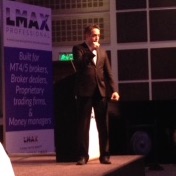As written following previous industry conferences, once again are my random musings gathered from the just completed Forex Magnates London Summit. Having covered quite a few different angles of the conference the review will be a multi-part affair, starting today with trends and then moving to products, Cryptocurrencies , and financial technology.
Optimism

One thing I have noticed this year is broker optimism. 2014 began terribly for volumes for the first seven months of the year. However, unlike 2012 where brokers appeared to be surprised and unprepared to deal with the volatility drop, firms tended to be more upbeat this year. I am pinning the change to the attitude of brokers after they went through some major cost cutting in 2012 and 2013 and now have a better idea of how thin they can reduce the core and remain ongoing businesses. The bottom line result for the Summit was that even with the backdrop of a depressed first half of the year, CEOs were out looking for new ways and ideas to do business and company wallets weren’t being closed until 2015.
Gold and CFDs
Also contributing to the optimism was the growth in gold and CFD trading activity. As reported on multiple occasions, CFD trading volumes compose a greater amount of overall online broker activity. CFDs typically provide higher margins than FX to brokers. Therefore, we expect this trend to continue as marketing focuses on the products. Two areas which are specifically seeing activity are in single stock CFDs and gold. With stocks, they provide a marketing advantage as the plethora of market events, such as earnings announcements, new products (think Apple Watch) and IPOs (Alibaba) are simple to promote to customers in order to interest them in trading.
In terms of gold, the precious metal has been a pocket of activity for brokers this year, with several firms telling us it was their most profitable market-making product for the first half of the year. Among retail brokers, gold is typically in the top 5 of most traded products. As a result, the lack of meaningful FX volumes was somewhat mitigated by excitement in gold volumes.
Beyond just gold margin trading, physical gold trading is becoming a hot commodity. Liquidity providers such as Boston Prime and Leverate have cited a strong demand for deliverable gold this year in markets such as Turkey, Africa and Southeast Asia. Among exhibitors, Bullion Capital, which provides a white label trading platform of deliverable precious metals to brokers, was an active participant at the Summit. Company representatives mentioned that demand was emanating from brokers who viewed their platform as providing among other things, a solid marketing tool in offering a unique product to customers.
Speaking about liquidity, an important feature that should help propel further growth in CFD volumes was the emergence of institutional CFD liquidity. Several banks and prime of primes cited that they had launched or were in the process of bringing to the market CFD liquidity which brokers could use to supply straight through processing (STP) trading to their customers or to hedge risk. Although institutional CFD liquidity does exist in the market, compared to the FX, available sources are a drop in the bucket. Therefore, the emergence of additional CFD providers, who are internally hedging their offering with futures, is expected to decrease spreads and costs of the product which could ultimately trickle down to better trading conditions for end-user retail customers.
Africa
While we are discussing gold, answering the question of hot markets, Africa often came up in conversations. The continent isn’t necessarily easy to do business in due to a lack of technology infrastructure and low wages. However, brokers on the ground are making inroads in marketing services to a small but increasing upper class. Specifically, gold trading followed by oil is viewed as the assets of choice for these investors, which isn’t surprising given the continent’s economic reliance on commodities. Looking ahead, due to the difficulties involved in getting established in the region, Africa would be my bet as leading the way in strategic broker partnerships and M&A for 2015.
Binary Options
Financial product, gaming product? Like their name, binary options tend to receive a two- sided opinion from the forex industry. During 2014, the market for the product continued to grow even as FX demand slowed down. At the Summit, the product was of course on display with several operators exhibiting. What was noticeable though, was that unlike in 2013 where it seemed that existing brokers were evaluating the product, the current feedback was that if a broker hadn’t launched them yet, they probably wouldn't in the near future. That attitude could change quickly if a large broker launches binaries and others follow suit. But, it definitely seems that brokers currently without a binary options unit were in no rush to add it and have their focus on other products like CFDs or regional growth.
This doesn’t mean the market for binaries is stalling. On the contrary, it may only get larger in 2015. But demand has shifted from existing financial players to other groups such as online marketers, serial entrepreneurs and gaming industry professionals. Also, while I am not sure how large this segment is, I have encountered several new brokers who stated they were planning, or at least investigating binary options as they discover what the best mix of products to offer customers is.
Automation

Yoni Avital of Tradesmarter Presenting at the Summit
Personally, I am a bit surprised it has taken this long, but automation was discussed more at this Summit than at previous events. Use cases cited were automated alerts to sales and support to contact customers experiencing account difficulties or margin related issues. Other examples were automated messages to clients based on trading action and fundamental news releases. Along this trend, among new products released was Tradesmarter's smart bonus tool which is similar to customer abandonment features used among ecommerce sites. The product creates automated bonuses for users based on how long they have been customers to both encourage new deposits and discourage traders from fully withdrawing funds (more on them in the products post).
Cloud-Based Trading
Presenting in the startup competition was Qubita. A week earlier Traide emerged out of its private beta. Also, earlier in the year Magick launched. Each of these firms provides a cloud-based solution for creating, backtesting and deploying automated strategies. To a lesser extent, we can throw social trading platforms into the mix as well. The bottom line is that automating trading is becoming easier to do for non-programmers.
My gut feeling is that we are still in the infancy of cloud-based trading, with user adoption minimal. However, combine these simple 'to build a strategy products' with a mobile offering to monitor and make small changes to strategies, it develops into a compelling reason for more traders to ditch point and click trading in favor of cloud-based automated trading.
Attended the Summit? Let us know in the comments what industry trends you found interesting.
















